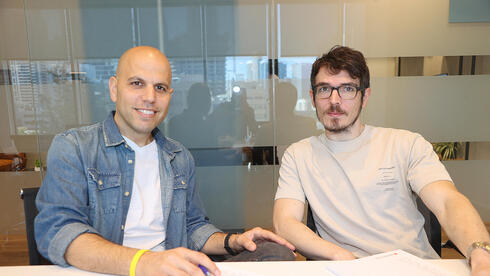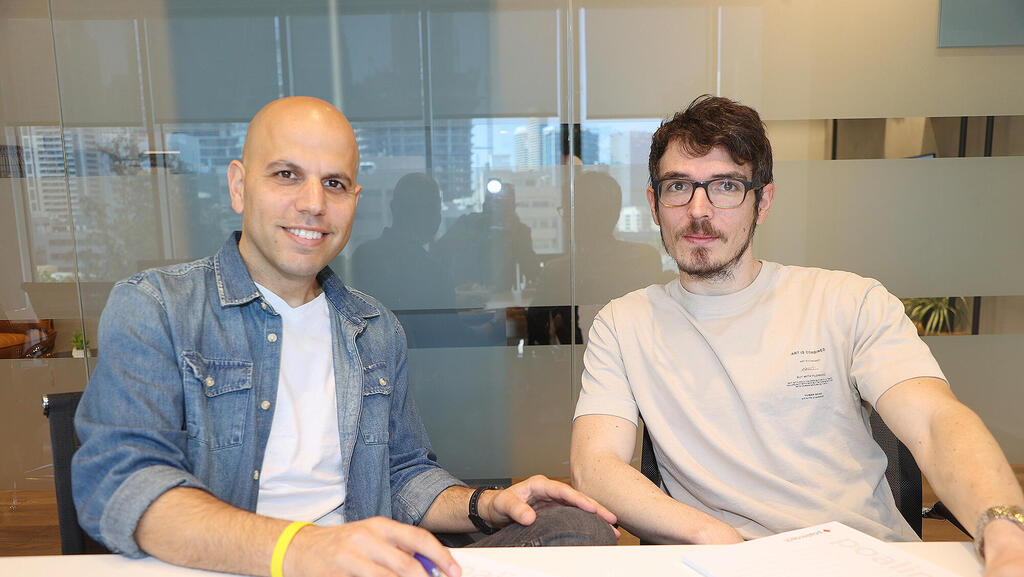
"From the very start, startups should consider who they are, what defines them, and what will help them succeed"
Oz Alon, CEO of HoneyBook, and Tom Nipravsky, CEO of Jux, recently engaged in a candid conversation about the challenges of building and maintaining a successful startup. The meeting was held as part of the Growth+ project by Calcalist and Poalim Tech, which organizes one-on-one counseling and mentoring sessions between experienced entrepreneurs and start-up companies in their early stages
Oz Alon, CEO of HoneyBook, and Tom Nipravsky, CEO of Jux, recently engaged in a candid conversation about the challenges of building and maintaining a successful startup. Held as part of the Growth+ project by Calcalist and Poalim Tech, which organizes one-on-one counseling and mentoring sessions between experienced entrepreneurs and start-up companies in their early stages, the discussion focused on crisis management, company culture, and the personal experiences that shape their leadership styles. Their insights provide valuable lessons for aspiring entrepreneurs navigating the early stages of their journeys.
HoneyBook develops a customer management platform for independent businesses, while Jux develops a code-based design tool that allows designers to design the real product as it will be in production.
Oz, tell us about a crisis you encountered at the beginning and what you learned from it that can help young entrepreneurs?
"We are a product company. Naama Alon, my wife and partner, is a designer, and as such, she really wants to solve problems. But she also really likes to build the product itself and be proud of what she creates, which has greatly influenced our company's culture. I remember a moment at the beginning when our partner Dror Shimoni decided to fundamentally change the whole 'flow' of the product. We launched the new version, but nothing changed. I realized they had changed something that no one saw or used. They expected a higher conversion rate at a certain stage of the marketing funnel, but no one ever reached that stage. We felt like idiots and decided that from then on, we would only change things based on user feedback. Over the years, we've continued to make such mistakes, but now we try to release smaller product changes and get real feedback from users to reach the market faster."
Tom, what is the biggest difficulty you have encountered in the last year?
"The truth is, there are two difficulties: the first is building a product, but now we are focusing more on the challenge of building the right culture for the company. This means understanding how the company operates both collectively and individually and how to integrate cultural values within the company."
Oz, what did you advise on this matter?
"The issue of company values and culture is very 'corporate.' This is something huge companies do, and I think Israeli startups have learned over the past few decades that building a company involves shaping its culture. From the very start, we should consider who we are, what defines us, and what will help us succeed."
What did you learn from each other?
Oz: "The feedback Tom receives is very similar to the feedback I get. They tell him, 'You have a very democratic culture and let your team speak a lot.' I believe that the less I speak at board meetings and the more my team speaks, the better the meeting is."
Tom: "The whole issue of culture. I truly believe that the atmosphere in the company and how people communicate with each other is what motivates them to come to work every morning."
Tell us about something interesting or surprising you found out about each other today.
Tom: "The fact that we go through the same things, despite the different stages of our companies. The challenges and self-doubts are something everyone experiences."
Oz: "I learned that Tom had a son during the very difficult period of building his company—a time when he had to meet complex goals, raise money, and build the company. I really liked hearing about taking responsibility. It's the ability to say, 'I made this mistake,' which is something sorely lacking in our society."














